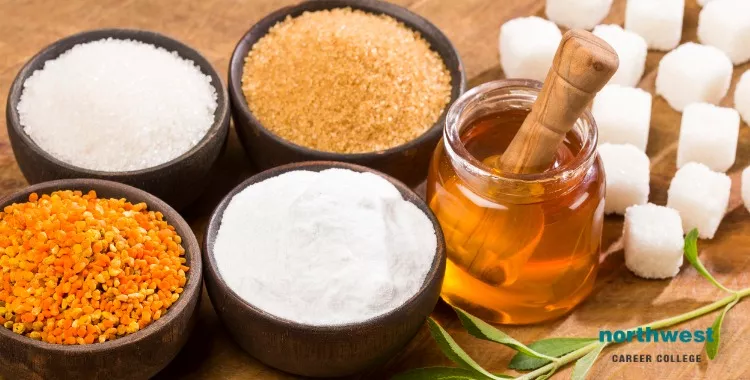What Are The Alternatives To Refined Sugar?
- Dental Assistant
- March 11, 2024
- 3.3k views
- 4 min read

Excessive sugar consumption has become one of the leading medical and dental health issues. Sugar is one of the main causes of tooth decay and has a number of medical drawbacks associated with it.
Eating too much sugar can contribute to people having too many calories, which can lead to weight gain. Being overweight increases your risk of health problems such as heart disease, some cancers, and type 2 diabetes.
As people have become more aware of the issues surrounding refined sugar, a number of sugar alternatives have come onto the market. In this article, we’ll be looking at the most popular Alternatives to Refined Sugar, how they work, and if they are actually a healthier option.
Table of Contents
5 Alternatives To Refined Sugar
Natural Sweeteners
One of the more popular alternatives to refined sugar is so-called natural sweeteners. A good example of a natural sweetener is coconut sugar.
Coconut sugar is also called coconut palm sugar. It’s a natural sugar made from coconut palm sap, which is the sugary circulating fluid of the coconut plant. It is often confused with palm sugar, which is similar but made from a different type of palm tree. Coconut sugar is still metabolized by oral bacteria in a similar way to refined sugar but it has a much lower glycaemic index. This means it does not trigger the same blood sugar spikes and crashes associated with refined sugar.
It also contains small amounts of various minerals, giving it a slight nutritional edge on refined sugar. However, despite being marginally more healthy, replacing all your refined sugar with natural sweeteners will not drastically improve your diet or your oral health.
Honey and Syrups
Various natural liquid sweeteners are alternatives to refined sugar during cooking. Examples include honey, maple syrup, date syrup, brown rice syrup, and agave syrup. These syrups do have some slight nutritional value, however, they also have varying levels of unrefined sugar, making some only marginally more healthy than sugar.
Nutritionists have also raised concerns about the increased consumption of these syrups after researching indicated that agave syrup could potentially have a negative impact on liver function.
Stevia
A natural sugar alternative made from plants in the Asteraceae family, stevia has a GI of zero. Also, it is metabolized by oral bacteria, meaning no increased risk of caries. However, stevia does come with its own drawbacks, including bloating, nausea, and gas.
Xylitol
Xylitol is a sugar alcohol derived from the bark of birch trees. It has a GI of seven, meaning very little impact on blood glucose levels. It doesn’t contain fructose, so also avoids the potential impact on the liver seen with some other sweeteners.
Xylitol has some potentially interesting properties for dentists. When ingested by oral bacteria it can disrupt their metabolic cycle, eventually leading to cell death and reduced risk of tooth decay.
These effects are somewhat offset by the fact that xylitol contains sugar alcohol. If consumed in large quantities, this can result in gastrointestinal disturbances. Xylitol is also not recommended for people with a history of irritable bowel syndrome (IBS).
Artificial Sweeteners
Common artificial sweeteners include Aspartame, Acesulfame potassium, Neotame, Sacchari, and Sucralose. While these artificial sweeteners are widely used, especially in diet drinks, there have been some concerns raised about their impact on the health of their customers. Artificial sweetener consumption appears to be linked to weight gain for many people. This is because people who choose a ‘diet’ food or drink item may then fool themselves into thinking it is okay to allow themselves a calorific reward for making this perceived healthy choice.

More worryingly, the intense sweetness of most artificial sweeteners, which are 100 to 200 times sweeter than sugar, can potentially change how we taste food, getting us accustomed to overly sweet foods. Since sweet foods trigger the brain’s reward system, this leads to us only craving extremely sweet foods.
Join One Of The Best Dental Assistant Training Schools In Vegas
Here at Northwest Career College, we firmly believe that learning is a process that continues on the job. Our Dental Assistant Training Course gives you all the critical skills and experience you’ll need to find the best dental assisting employment opportunity in Las Vegas.
Our Dental Assistant School offers morning, afternoon, and night classes to accommodate your busy work and family schedule. Call us at (702) 403-1592 to speak to one of our admissions assistants about your new dental assisting career.



